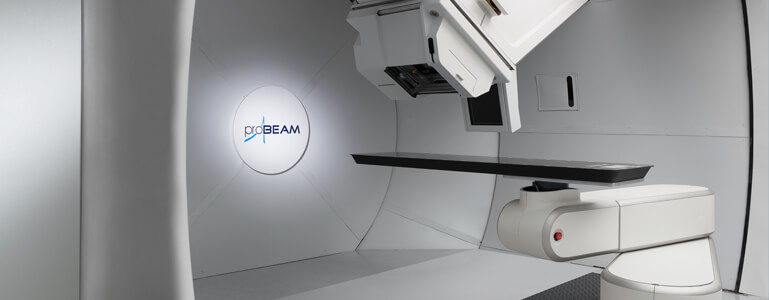Proton Therapy For Prostate Cancer Treatment
Fight Prostate Cancer with Laser-Like Precision
California Protons’ director, Carl Rossi, MD, is internationally recognized for personally treating more than 10,000 prostate cancer patients with proton radiation therapy over the last 26 years—more than any other physician in the world.
Compared with older passive-scattering proton therapy treatment, our pencil beam scanning technology precisely delivers proton radiation treatment for prostate cancer with unmatched precision and the utmost care. It enables our physicians to attack prostate tumors, layer-by-layer, with high-dose radiation and minimize exposure to unaffected areas. This is important for prostate cancer patients who may face the risk of erectile dysfunction, decreased testosterone levels, urinary and rectal problems and gastrointestinal disorders due to radiation. The reduction of radiation-related toxicity also increases the likelihood that patients can complete treatment with fewer interruptions or delays.
Why Choose California Protons For Your Treatment?
At California Protons Cancer Therapy Center, you benefit from our state-of-the-art pencil beam scanning technology, which allows for unparalleled precision in targeting prostate cancer, while minimizing radiation exposure to healthy surrounding tissues. Our experienced medical team, led by Dr. Carl Rossi, has a long history of successfully treating prostate cancer with proton therapy, having treated more patients than any other physician in the world.
What Is Proton Therapy For Prostate Cancer?
Proton therapy for prostate cancer is an advanced form of radiation therapy that uses a precise beam of protons to deliver high-dose radiation directly to the cancerous cells in the prostate.
Unlike traditional X-ray radiation, protons have a unique characteristic known as the Bragg peak, allowing them to deposit the majority of their energy at a specific, controlled depth within the prostate, and then stop.
This significantly reduces the exit dose of radiation, protecting healthy tissues and organs located beyond the prostate from unnecessary exposure. This targeted approach helps to minimize side effects often associated with prostate cancer treatment.
Proton Therapy for Prostate
Cancer Treatment Details
What We Treat
- Early stage prostate cancer
- Locally advanced prostate cancer (Stage III and IV)
- Some cases of metastatic cancer
- Recurrent cancer
What We Do
- Target the prostate only
- Protect fragile healthy tissues, your rectum, bladder and bowel
- Maintain your quality of life during treatment
- Reduce side effects, including lowered testosterone levels, urinary and rectal problems, and gastrointestinal disorders
- Lower the risk of secondary cancer due to radiation
SpaceOAR® Hydrogel – Spacing Organs at Risk
In an effort to minimize unnecessary radiation, unwanted side effects and potential injury to the rectum during prostate cancer treatments and other special situations, we give patients the option of hydrogel. California Protons offers this minimally invasive procedure to inject the hydrogel in our facility. Once in place, it typically cannot be felt and acts as a 1.3cm spacer1 to push the rectum away from the prostate. The spacer remains in place for about three months, after which it is fully absorbed and naturally cleared in your urine.
Procedural success rate2
0
Adverse device events2
Benefits of Proton Therapy for Prostate Cancer

- Our pencil beam scanning technology precisely controls protons to place the Bragg peak—the point at which they deposit their maximum energy—directly in the prostate.
- Advanced proton therapy allows doctors to more selectively deliver high-dose radiation to cancerous prostate gland cells, and reduce the dose to surrounding healthy tissues and critical organs. In some cases, this has been shown to deliver higher cure rates than X-ray radiation treatment even in some of the most challenging situations. In one study, 97 percent of 4,000 proton therapy patients had not suffered a recurrence; many of the cancer-free patients had completed treatment as long as 10 years earlier.3
- Reduced prostate cancer treatment side effects and no effect on testosterone levels. A 2013 study found no significant changes in testosterone levels in low- and intermediate-risk prostate cancer patients.4 Another study found significantly lower radiation exposure to the rectum and bladder with proton therapy than with X-ray radiation, which has been shown to reduce the chances of developing urinary and bowel problems.5
- Shortened prostate cancer treatment time, higher doses, lower costs and less disruption to a patient’s life with hypofractionation treatment. Multiple trials in both the U.S. and UK have shown that hypo fractionation (4 to 6 weeks of treatment) is just as effective as 8 to 9 weeks and no more toxic to healthy tissue.
- Unlike with older technology, the treatment plan can be loaded into the computer and completed within a matter of minutes. Treatments for prostate cancer are also non-invasive and convenient so patients can get back to their daily activities quicker.
Prostate Cancer Stages
& Treatment
The stage of prostate cancer is one of the most important factors in selecting treatment. Depending on the stage, combined treatments of surgery, radical prostatectomy, brachytherapy, hormone therapy, chemotherapy and radiation therapy may be needed for some prostate tumors. Treatment options also are affected by the type of prostate cancer, age, overall health and personal preferences.
At stage I, prostate cancer is found in the prostate gland only. Radiation therapy for stage I prostate cancer is often recommended to reduce the risk of cancer spreading, especially for those with higher Gleason scores and PSA levels.
At stage II, prostate cancer is more advanced than in stage I, but has not spread outside the prostate. Stage II is divided into stages IIA (half or less of a lobe) and IIB (half or more of a lobe). At this stage of prostate cancer, both surgery and radiation therapy are treatment options. Radiation therapy may still be recommended after surgery to further reduce the risk of cancer spreading or returning.
Stage III prostate cancer has spread beyond the outer layer of the prostate and may have spread to the seminal vesicles. Surgery and radiation therapy with hormonal therapy are curative treatment options at this stage of prostate cancer. Radiation therapy may still be needed after surgery to provide additional local and distant cancer control.
Stage IV prostate cancer may have spread beyond the seminal vesicles to nearby tissue or organs, such as the bladder, rectum or lymph nodes. At this stage, treatment of the whole body with hormonal therapy or systemic therapy is the mainstay of treatment. Local therapy with surgery or radiation therapy may be needed to help control symptoms. Proton radiation treatment may be used for advanced or late-stage prostate cancer to shrink tumors or control pain.
Proton Therapy vs. Radiation Therapy for Prostate Cancer Treatment
While both proton therapy and traditional X-ray radiation therapy use radiation to kill cancer cells, their fundamental differences lie in how they deliver that radiation.
Traditional X-rays deposit energy as they enter and exit the body, exposing healthy tissues along the entire path. In contrast, proton therapy leverages the “Bragg peak” phenomenon, allowing protons to release most of their energy precisely at the prostate and then stop.
This minimizes the radiation dose to surrounding healthy organs and tissues, leading to a lower risk of side effects such as erectile dysfunction, urinary and bowel problems, and even secondary cancers. This precision makes proton therapy particularly advantageous for treating prostate cancer, where vital organs are in close proximity.
Treatment for Recurrent Prostate Cancer
Proton therapy is often the best way to treat recurrent tumors in areas that have previously been treated with radiation therapy.
Treating previously irradiated areas can be challenging. The healthy tissues around the recurrent tumor do not fully “forget” the previous radiation dose, and any added dose continues to increase the risk of normal tissue injury. Proton beam therapy may enable doctors to better concentrate the dose to the target and limit it elsewhere, allowing re-treatment with radiation in select patients.
What To Expect During Your Treatment For Prostate Cancer
When you choose California Protons for your prostate cancer treatment, you can expect a comprehensive and supportive experience.
Your journey will begin with a thorough evaluation by our expert medical team, who will develop a personalized treatment plan tailored to your specific needs and cancer stage. Treatment sessions are typically non-invasive and relatively quick, often lasting only a few minutes.
You’ll lie comfortably on a treatment couch while the proton beam is precisely delivered. Our team will guide you through each step, ensuring your comfort and understanding. Most patients experience minimal disruption to their daily routines and can continue with normal activities throughout their treatment course.
Prostate Cancer Treatment Outcomes
& Long-Term Effects
Proton therapy treatment for prostate cancer at California Protons Cancer Therapy Center in San Diego may offer similar outcomes to standard X-ray radiation, while reducing long-term and potentially life-threatening side effects such as erectile dysfunction, lowered testosterone levels, urinary and rectal problems, and gastrointestinal disorders due to radiation damage to the rectum, bowel and bladder. It also offers the possibility of lower chances for secondary cancers later in life due to the reduced radiation exposure to healthy tissues and organs.
However, all cancer treatments have advantages and disadvantages. Be sure to discuss all of the potential risks, as well as treatment options for prostate cancer, with your oncologist or urologist.
Contact California Protons Cancer Therapy Center Today
Ready to learn more about how proton therapy can offer a precise and effective treatment option for your prostate cancer? The team at California Protons Cancer Therapy Center is here to answer your questions and guide you through the process.
Don’t wait to explore advanced treatment options. Request an appointment today to schedule a consultation with one of our experienced prostate cancer specialists. We are committed to providing personalized care and empowering you with the information you need to make informed decisions about your health.



